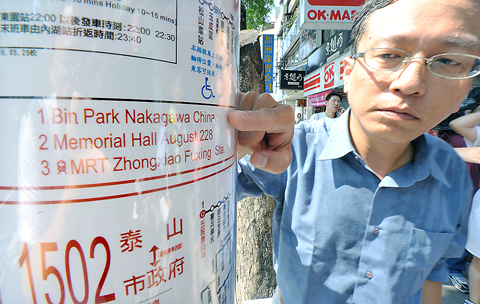Exactly what is “Bin Park Nakagawa China?”
Incredibly, it is the English translation for Taipei City’s Hua Zhong Riverside Park (華中河濱公園) and it is printed on new bus signs at Pojen General Hospital on Guangfu North Road.
The route map for bus 204 also displays the English name “Memorial Hall August 228,” when the proper translation should read “228 Memorial Hall” (二二八國家紀念館).

PHOTO: CNA
Leading reporters to Pojen General Hospital’s bus station yesterday morning, Democratic Progressive Party (DPP) Taipei City Councilor Chou Wei-you (周威佑) said the English translation of the park was something that would “make somebody laugh his head off.”
“It is not the only bus sign that has ridiculous English translation,” he said.
Chou said that you would need to understand Japanese to understand the English for Songshan Station as displayed at the Taiwan Television bus station, because the name was translated as “Matsuyama station.”
Another confusing translation is “Armed Forces Songshan Hospital,” he said, as the correct translation should have been “National Defense Medical Center.”
At Taiwan Adventist Hospital’s bus station, the English translation for MRT Ximen station was inconsistent, on some routes it is spelled “Simon,” and on others “Ximen,” he said.
DPP candidate for councilor in the Taipei City municipality elections, Liang Wen-Chieh (梁文傑), said he suspected the city had hired a Japanese with poor English to do the translation.
He demanded that the city correct the errors as quickly as possible and reprimand whoever was in charge of the translation project.
“Errors happen, but what usually happens is nobody gets punished for the mistakes they make. However, taxpayers must foot the bill to clean up this mess,” Liang said.
A passerby, who asked to be identified just by his surname Lo, said he studied in the US and scored nearly 600 in the TOFEL exam, but he could not figure out what “Bin Park Nakagawa China” meant. The name “Memorial Hall August 228” also baffled him, he said, adding that it was strange to add “August” before 228.
“I think foreigners will find them confusing too,” Lo said.
Walker Frost, an American out walking with two female friends near the bus station, said he found the bus signs a little confusing, but since he has been living in China for a while, he was used to these kinds of names.
“I think for a native English speaker, there is a difference in the way places are named,” he said.
Frost said although it was unusual, he did not think it was necessarily a bad thing.
“I think if somebody is interested to learn a little bit more about where they are, then it can actually have a lot of interesting significance,” he said.
The company contracted by the city to design the bus signs and provide the English translations said they only learned of the errors yesterday and would take immediate action to replace about 60 signs along the route of bus 204.
“We will work overtime tonight and we will not stop working until we accomplish the task,” said Lin Jing-yi (林靜宜), deputy manager of the company.
Lin said the translation was handled by an employee in his 20s, adding that the student had “studied in college and thought his English was good [enough].”
Lin said the young man was unaware of what had happened and that the company did not intend to tell him because he quit his job on Saturday after working at the firm for six months.

CHIPMAKING INVESTMENT: J.W. Kuo told legislators that Department of Investment Review approval would be needed were Washington to seek a TSMC board seat Minister of Economic Affairs J.W. Kuo (郭智輝) yesterday said he received information about a possible US government investment in Taiwan Semiconductor Manufacturing Co (TSMC, 台積電) and an assessment of the possible effect on the firm requires further discussion. If the US were to invest in TSMC, the plan would need to be reviewed by the Department of Investment Review, Kuo told reporters ahead of a hearing of the legislature’s Economics Committee. Kuo’s remarks came after US Secretary of Commerce Howard Lutnick on Tuesday said that the US government is looking into the federal government taking equity stakes in computer chip manufacturers that

NORTHERN STRIKE: Taiwanese military personnel have been training ‘in strategic and tactical battle operations’ in Michigan, a former US diplomat said More than 500 Taiwanese troops participated in this year’s Northern Strike military exercise held at Lake Michigan by the US, a Pentagon-run news outlet reported yesterday. The Michigan National Guard-sponsored drill involved 7,500 military personnel from 36 nations and territories around the world, the Stars and Stripes said. This year’s edition of Northern Strike, which concluded on Sunday, simulated a war in the Indo-Pacific region in a departure from its traditional European focus, it said. The change indicated a greater shift in the US armed forces’ attention to a potential conflict in Asia, it added. Citing a briefing by a Michigan National Guard senior

POWER PLANT POLL: The TPP said the number of ‘yes’ votes showed that the energy policy should be corrected, and the KMT said the result was a win for the people’s voice The government does not rule out advanced nuclear energy generation if it meets the government’s three prerequisites, President William Lai (賴清德) said last night after the number of votes in favor of restarting a nuclear power plant outnumbered the “no” votes in a referendum yesterday. The referendum failed to pass, despite getting more “yes” votes, as the Referendum Act (公民投票法) states that the vote would only pass if the votes in favor account for more than one-fourth of the total number of eligible voters and outnumber the opposing votes. Yesterday’s referendum question was: “Do you agree that the Ma-anshan Nuclear Power Plant

ENHANCED SECURITY: A Japanese report said that the MOU is about the sharing of information on foreign nationals entering Japan from Taiwan in the event of an emergency The Ministry of Foreign Affairs yesterday confirmed that Taiwan and Japan had signed an agreement to promote information exchanges and cooperation on border management, although it did not disclose more details on the pact. Ministry spokesman Hsiao Kuang-wei (蕭光偉) said the ministry is happy to see that the two nations continue to enhance cooperation on immigration control, in particular because Taiwan and Japan “share a deep friendship and frequent people-to-people exchanges.” “Last year, more than 7.32 million visits were made between the two countries, making it even more crucial for both sides to work closer on immigration and border control,” he said. Hsiao